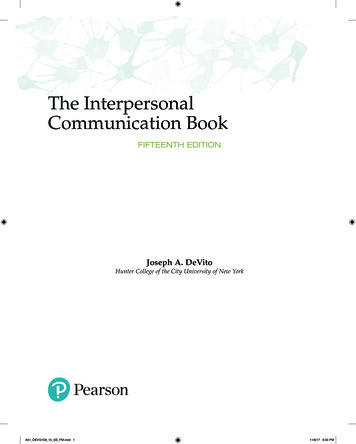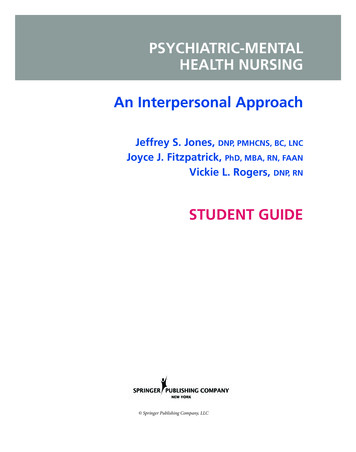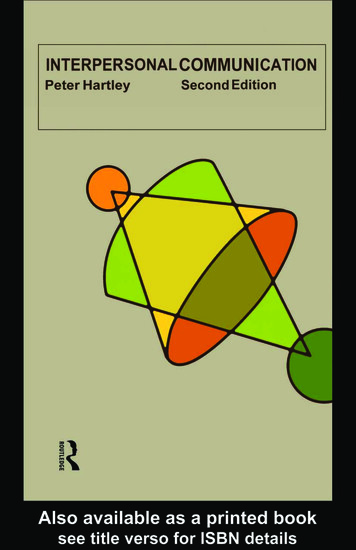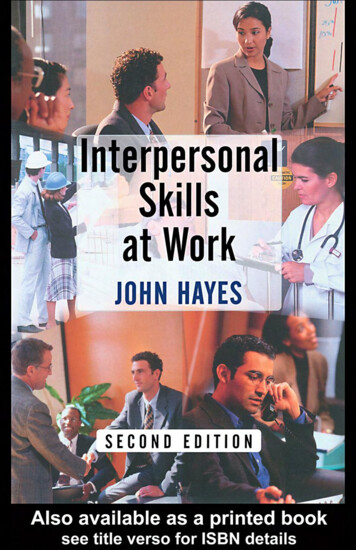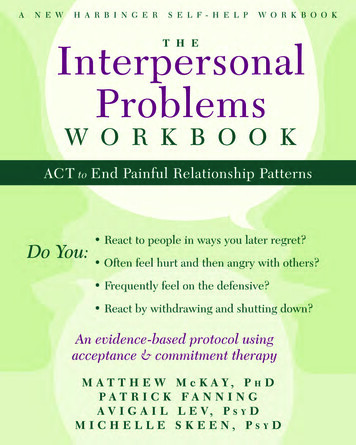
Transcription
“The Interpersonal Problems Workbook is a brilliant resource for anyone struggling with a patternof relationship problems. It is straightforward, thoroughly researched, and wonderfully compassionate. This book is a gentle but powerful guide to becoming the person you want to be, andcreating the relationships you want to have.”—Shawn T. Smith, PsyD, author of The User’s Guide to the Human Mind“Our relationships with others that provide such enrichment and meaning to our lives, can,unfortunately, also a serve as a source of deep pain and suffering. This scientifically-supportedand easy-to-follow workbook provides a step-by-step way to break out of long-standing patternsof behavior that prevent our relationships from being more vital and fulfilling. Think of it as anoperating manual for turning around troubled interpersonal relationships. I recommend thislatest contribution by McKay and his colleagues not only as a self-help guidebook, but also as auseful adjunct to their related book for mental health professionals working with those whostruggle with interpersonal relationship issues.”—Robert Zettle, author of ACT for Depression“The Interpersonal Problems Workbook validates the emotional pain connected to interpersonaldifficulties that we all experience throughout our lives. It provides worksheets and exercises tohelp readers gain insight into where this pain comes from, and teaches techniques to helppeople end these unhealthy patterns, subsequently having the effect of reducing emotionalpain. This is a fabulous book that will help people get unstuck from ineffective relationshippatterns, and that will provide clinicians with the much-needed, concrete tools to help clientswith these issues.”—Sheri Van Dijk, MSW, RSW, psychotherapist and author of several books,including Don’t Let Your Emotions Run Your Life for Teens, Calming theEmotional Storm, and DBT Made Simple“The Interpersonal Problems Workbook is an excellent resource for any individual or therapistworking with clients who have maladaptive relationship patterns. This workbook uses a treatment protocol that is grounded in the core principles of acceptance and commitment therapy.Not only do clients get to explore their schemas, but they get to learn about their core valuesand how to live a life of mindfulness. I highly recommend this book to anyone struggling withpainful interpersonal problems. This workbook is an invaluable tool for any mental healthpractitioner or person wanting to improve his or her relationships.”—Raychelle Cassada Lohmann, MS, LPC, professional counselor, author ofThe Anger Workbook for Teens, Staying Cool When You’re Steaming Mad, andcoauthor of The Bullying Workbook for Teens
“A well-conceived, research-based, step-by-step series of exercises guides individuals to identifyand mindfully address the schemas that inhibit their ability to form happy, healthy relationships. It is not necessary to be especially well-versed in ACT to benefit from this practicalapproach. Everything you need to begin addressing the pain that accompanies poor interpersonal relating can be found in this highly worthwhile workbook.”—Stan Tatkin, PsyD, MFT, clinician, researcher, teacher, and developer of aPsychobiological Approach to Couple Therapy (PACT)“If you’re tired of merely thinking and talking about your problems with family, loved ones,friends, colleagues, and coworkers, then this book is for you. It teaches you a host of new valuable skills that will actually not only help you with interpersonal problems but will also come inhandy in many other areas of your life. The book explains in simple, straight-forward, andaccessible language how certain thought patterns and beliefs about yourself and your relationship with the world can keep you unhappy and stuck in patterns of behavior that clearly havenot worked in the past. It then quickly moves on and provides you with a variety of extremelyhelpful exercises that you can put into practice right away. These exercises are simple but theyare not simplistic. They have proven themselves many times over and are backed up by a stackof research studies attesting to their usefulness. This book is for you and will help you if you areserious about moving past your relationship pain (and what your mind tells you about thatpain) and are willing to take the steps toward doing what matters—you have nothing to loseand much to win!”—Georg Eifert, PhD, Chapman University Professor Emeritus of Psychologyand coauthor of the Mindfulness and Acceptance Workbook for Anxiety“At the heart of happiness is the ability to have strong and healthy relationships. Strugglingwith interpersonal problems can make you miserable. This book teaches you proven techniquesfor developing the skills to relate to other people in a much healthier and productive manner. TheInterpersonal Problems Workbook will help you deal with the thoughts and emotions that createobstacles in your relationships while also guiding you towards building genuine connectionswith the people in your life.”—D. J. Moran, founder of the MidAmerican Psychological Institute
“Inspired in part by the work of Jeffrey Young, founder of the schema therapy approach, TheInterpersonal Problems Workbook offers valuable strategies for dealing with some of the most difficult challenges we face with some of the most important people in our lives. This comprehensiveworkbook provides the reader with meaningful ways to look beneath the trappings of early lifethemes that can prompt our self-defeating responses when triggered. We learn how to move beyondthese embedded automatic patterns in order to achieve effective/adaptive interpersonal experiences and coping styles. Hats off to the authors for this creative and thoughtful guide.”—Wendy Behary, author of Disarming the Narcissist“For most of us, when our relationships are not working, life is not working.Despite their central link to human health and happiness, psychology has been appallingly lax indeveloping specific methods that will help with interpersonal problems. This book helps end thatodd silence. It puts forward a creative, step-by-step approach that research suggests can make a realdifference in the quality of your relationships, now. Its clear, sound guidance will help you create abetter life for you and those you love. Highly recommended.”—Steven C. Hayes, cofounder of acceptance and commitment therapy and authorof Get Out of Your Mind and Into Your Life“The Interpersonal Problems Skills Workbook is a highly needed self-help book for those strugglingwith chronic interpersonal problems. The authors did an outstanding job guiding readers throughthe process of identifying their schemas, triggers as well as old behaviors; furthermore, they makesure to walk readers step-by-step on how to develop new behaviors that are in alignment with theirinterpersonal values. This self-help book will help everyone struggling with ongoing relationshipproblems. I highly recommend it not only because of its rich content but also because of theresearch that supports its evidence.”—Patricia E. Zurita Ona, PsyD, psychologist at the East Bay Behavior TherapyCenter and coauthor of Mind & Emotions“Reader, you are holding in your hands a resource that can profoundly improve and transform yourinterpersonal relationships. An entirely new approach to healing, this clear, brilliantly conceivedworkbook unites the ancient wisdom found in mindfulness practices with the practical skills ofcontemporary psychotherapy. Don’t let a chance like this slip out of your hands.”—Steve Flowers, MFT, author of The Mindful Path Through Shyness and LivingWith Your Heart Wide Open
T h eInterpersonalProblemsW o r k b o o kACT to End Painful relationship PatternsMaTThewPaTricKaVigaiLMicheLLeM c K a y, P h DFa n n i n gL e V, P s y DSKeen, PsyDNew Harbinger Publications, Inc.
Publisher’s NoteThis publication is designed to provide accurate and authoritative information in regard to the subject matter covered. It is sold with theunderstanding that the publisher is not engaged in rendering psychological, financial, legal, or other professional services. If expert assistance or counseling is needed, the services of a competent professional should be sought.Distributed in Canada by Raincoast BooksCopyright 2013 by Matthew McKay, Patrick Fanning, Avigail Lev, and Michelle L. SkeenNew Harbinger Publications, Inc.5674 Shattuck AvenueOakland, CA 94609www.newharbinger.comCover design by Amy ShoupText design by Michele Waters-KermesAcquired by Jess O’BrienEdited by Nelda StreetAll Rights ReservedLibrary of Congress Cataloging-in-Publication DataMcKay, Matthew.The interpersonal problems workbook : act to end painful relationship patterns / Matthew McKay, PhD, Patrick Fanning,Avigail Lev, PsyD, and Michelle Skeen, PsyD.pages cmIncludes bibliographical references.ISBN 978-1-60882-836-4 (pbk. : alk. paper) -- ISBN 978-1-60882-837-1 (pdf e-book) -- ISBN 978-1-60882-838-8 (epub) 1.Interpersonal conflict. 2. Interpersonal relations. I. Title.BF637.I48M428 2013158.2--dc232013014287
For my daughter, Bekah—A beautiful, bright light.MMFor my wife, Nancy Kesselring.PFFor my parents, Agnes and Sam,who’ve always been there for me.ALFor Eric, Jake, and KellyFor their love, support, and laughter.MS
ContentsIntroduction 123456789101112131415Defining Interpersonal Problems Identifying Schemas Schema Triggers How Schemas Affect Your Relationships Schema Coping Behavior Outcomes Mindfulness Observing Your Relationships Mindfully Values Willingness Defusion: Watching, Labeling, and Letting Go of Thoughts Defusion: Distancing Facing Schema Emotions Acceptance Nonviolent Communication Defusion, Acceptance, and Values in Everyday Life Appendix: Note to Therapists References 139253339455365738397111121129137149151
IntroductionInterpersonal problems often occur across multiple relationships and areas of your life (friends,family, work, partner, and so on). These problems can trigger intense suffering for you and thoseyou care for. If you are reading this book, you are likely struggling in some of your relationships,perhaps reacting in damaging ways to interpersonal stress. You may also have primary concernssuch as anxiety, depression, or trauma coupled with relationship problems. You have probablyfound that treatments targeting your anxiety, depression, or trauma have not been very helpful insolving your interpersonal struggles.We have combined ideas from schema-focused therapy with methods from acceptance andcommitment therapy (ACT) to help you identify and change hurtful interpersonal patterns. Thisbook focuses on ten schemas—abandonment/instability, mistrust/abuse, emotional deprivation,defectiveness/shame, social isolation/alienation, dependence, failure, entitlement/grandiosity, selfsacrifice/subjugation, and unrelenting standards/hypercriticalness—that are the deeply ingrainedpatterns of thought driving problematic coping behaviors. When situations or conversations triggeryour schemas, your reaction is to protect yourself—avoid painful emotions. Unfortunately, yourschema coping behaviors often make your relationships worse and increase your suffering.This book provides you with an empirically-validated protocol—based on ACT—for addressing your interpersonal problems. You will learn to deal with schema-triggered pain differently, andto replace ineffective schema coping with responses based on your deepest values. Be warned: thisis a “work” book—you must do the exercises in the book to make progress. At times, the processwill be challenging and emotional, but it can result in greatly improved relationships. We all thrivewhen we are in loving, healthy relationships. Now, let’s get started.
CH A P T ER 1Defining InterpersonalProblemsDo family gatherings leave you feeling isolated and alienated from your relatives? Can you name along list of ex- friends you never hear from anymore? Have you had trouble maintaining a seriouslove relationship? Is your work life marked by friction with bosses and other employees? If theanswers to these questions are predominantly yes, you may be suffering from interpersonalproblems.In this chapter you’ll learn about the nature of interpersonal problems, what causes them, andhow you can overcome them. The treatment program you’ll be introduced to is research based(McKay, Lev, and Skeen 2012) and has been shown to be highly effective in changing problematicinterpersonal behavior.What Are Interpersonal Problems?Interpersonal problems are simply recurring relationship problems. If you have trouble relating to orgetting along with family, friends, loved ones, colleagues, coworkers, and so on; the problems havebeen with you for a long time, come up frequently, and seem to follow a familiar pattern. ExampleI’m June, a forty- eight- year- old real estate agent. I was fighting a lot with Ben, my thirdhusband. He complained that I was too negative and not emotionally available to him. Heseemed awfully needy to me, very grabby and clingy. I felt smothered around him. But I
The Interpersonal Problems Workbookdidn’t want to get divorced. For one thing, I couldn’t afford to pay for my rent andhealth insurance on my own. The real estate market was lousy from the day I got mylicense, and my commissions have never added up to a real living. I didn’t hit it off withclients and did not develop the kind of repeat customers that other agents in my officehad.As for friends, I really only had one, an appraiser named Margie. We’d get togetherFriday nights to drink margaritas and make fun of everybody we knew in the localbusiness community. Eventually life with Ben got so stressful that he and I agreed toseparate for a while. Margie let me move into her guest room, and that was okay forabout two weeks. We started to get on each other’s nerves, and she eventually said itwas time for me to move on. What Causes Interpersonal Problems?Interpersonal problems are caused by maladaptive coping strategies: unhelpful ways in which youhabitually deal with interpersonal stress. For example, when June’s husband, Ben, accused herof being cold and distant, she coped with this interpersonal stress by attacking him: she accusedhim of smothering her and trying to micromanage their relationship.Attacking is just one of the maladaptive coping strategies that can lead to an interpersonalproblem. Some people who are faced with the same criticism might cope by withdrawing. Theywould escape the situation and the relationship by simply ignoring the criticism, refusing to talkabout it, changing the subject, or leaving the room.Clinging is another strategy that some people use to cope with interpersonal stress. Theybecome very dependent on their loved ones, insisting that they cannot live without the relationship. It’s a kind of emotional blackmail that says, “If you leave me, I’ll collapse.”Another faulty coping mechanism is blaming. June might have blamed her husband for herdistance from him, accusing him of pushing her away. Or she might have coped with the stressof his complaints by surrendering, saying immediately, “Oh, you’re right. I’m sorry, I’ll tryharder,” never really meaning to change, but just wanting the upset to end quickly.Where do these faulty coping strategies come from? Many are learned in childhood, whenthey help people survive family life. For example, as a child, you might surrender to a domineering parent to stay safe. You might cope with a detached father by withdrawing or becomingclingy and overly compliant out of fear of abandonment. Sometimes children learn how to cope4
Defining Interpersonal Problemsby copying what they see their parents doing: going on the attack when they feel frightened, orblaming others when they’re hurt.Some coping strategies are learned later on, when you stumble onto something that seemsto help in social situations so you keep doing it. For example, Rick found out early in gradeschool that he could avoid some bullying and get some attention by cracking jokes and makinghis classmates laugh. He became the class clown, reacting to all kinds of social stress withhumorous remarks. Unfortunately, he found later that he needed more than humor to succeedin marriage and a career.That’s the trouble with all these maladaptive coping mechanisms: in the short term, theyhelp a little to protect you and cushion you from stress with certain people, so you keep usingthem. Over time they become inflexible, fixed patterns of behavior. You tend to react to allsocial situations the same way, time after time. The faulty coping strategies become generalizedand pervasive: the way you handled your parents or your peers in third grade becomes the wayyou try to handle your adult friends, your lover, your spouse, or your boss. But what workedmarginally back then works horribly now. The short- term strategy has become a long- termproblem.So you should just change coping strategies, right? That’s not so easy, as June discovered. ExampleThis is June again. I took a workshop from this super- salesman guy at the realtyassociation. He told us very clearly how to behave when you’re showing houses toprospective buyers: you should be positive at all times, pointing out the best features ofthe house. You should ask polite, personal questions and show interest in their kids andjobs. You should refrain from criticizing the seller or the house. Above all, you shouldanswer all questions—however dumb—fully and clearly and patiently.After the workshop, I was fired up, and I resolved to follow all the guidelines andstart developing better rapport with my prospects. But people can be so stupid andirritating! They ask the same dumb questions over and over, and they don’t payattention to the answers. In about two weeks I was back to my old tricks: one- wordanswers, thinly veiled sarcasm, negativity, and impatience. 5
The Interpersonal Problems WorkbookWhat Makes Maladaptive CopingStrategies So Persistent?If these ways of relating to others are so obviously unproductive, why is it so hard to changethem? Because maladaptive coping strategies are not just simple habits reinforced by repetition;they arise from a deeper level, from almost- unconscious beliefs called schemas. Schemas aredeeply held core beliefs about who you are as a person and the nature of your relationships toother people. Here are some typical schemas that can lead to interpersonal problems:People are always leaving me.It’s dangerous to trust people too much.No one really cares for me or gives me what I need.There’s something wrong with me.I don’t belong anywhere.I can’t take care of myself; I need someone to help me.Other people’s needs are more important than mine. I have to put them first.I should function at the highest level. Mistakes aren’t acceptable.Only the best is good enough for me.I’m going to fail at what I do.If you have schemas like these, you act them out over time, developing those maladaptivecoping strategies that are so hard to change. Your schemas guide not only your behavior, butalso how you interpret other people’s behavior. You see others in the light of your schemas,noticing their negative words and actions that reinforce your schemas and filtering out anything that contradicts your core beliefs.Your schemas are deeply ingrained, and they persist because they help you understand theworld and organize your life. A schema like It’s dangerous to trust people too much can serve as aguideline in many situations, making you feel safe and independent and strong— at least in theshort term, until loneliness and isolation lead to chronic depression and resentment.6
Defining Interpersonal Problems ExampleI’m Ross. I’m twenty- nine years old. I’ve always felt that I’m damaged goods, that noone could really love me if they knew the real me. That’s the schema that runs my lovelife. Whenever I start getting close to someone, I’m afraid she’ll see how messed up Iam. So I tend to dump women before they can dump me. It’s a way of protecting myself,rejecting someone before she can reject me.I tried to change with my last girlfriend, Irene. I resolved to hang in there when shestarted talking about how well we got along and hinting about moving in together. Butthe pressure built up, and I got more and more tense around Irene until, finally, onenight I started a big argument and we broke up. It was weird— I could almost watchmyself doing exactly what I had planned not to do, but I couldn’t stop doing it. At thispoint, I’m not open to any new relationships. They’re too painful and bound to fail. How Can You OvercomeInterpersonal Problems?To overcome interpersonal problems, you need to set and accomplish four essential goals. First,you have to change problem behaviors, such as habitually bragging or harshly criticizing orangrily lashing out at people. Second, to get along with different kinds of people, you need todevelop some behavioral flexibility: a range of social responses that are appropriate to a rangeof situations. Third, you need to detach yourself from some negative, self- defeating beliefs aboutyourself and others. Fourth and finally, you have to learn how to stop avoiding the social situations in which you feel uncomfortable.To accomplish these four essential goals, this book combines techniques from acceptanceand commitment therapy (ACT) developed by Steven Hayes and associates (Hayes, Strosahl,and Wilson 1999) and schema therapy developed by Jeffrey Young and associates (Young,Klosko, and Weishaar 2006). As you work through this book, you will learn to deal with yourinterpersonal problems by taking these six steps:1. Uncover your schemas.2. Identify your maladaptive coping strategies.3. Identify your core values about how you want to be in your relationships.7
The Interpersonal Problems Workbook4. Learn to observe and accept schema pain without acting on it.5. Learn to distance yourself from painful schema- driven thoughts.6. Turn values— who you want to be in your relationships— into action.This approach has been proven to work by Avigail Lev, who, in 2011, conducted a randomized controlled trial of these techniques that showed significant decreases in problematic interpersonal behaviors (Lev 2011; McKay, Lev, and Skeen 2012).8
CH A P T ER 2Identifying SchemasIn this chapter you will identify the maladaptive schemas that underlie your interpersonal problems. A maladaptive schema (Young 1999) is essentially a belief about yourself and your relationshipto the world—the core sense and feeling is that something is wrong with you, with your relationships, or with the world at large. These schemas interfere with your ability to feel safe and to satisfyyour basic needs in relationships to others. Jeffrey Young and associates (Young, Klosko, andWeishaar 2006) developed a treatment—Schema Therapy—that identified the particular schemasyou’ll explore below.How Schemas Are Formed and Take HoldMaladaptive schemas are formed in childhood and develop as a result of ongoing, dysfunctionalexperiences with parents, siblings, and peers. They come from specific traumatic events or fromrepeated toxic messages that you receive about yourself: “You’re bad” or “You don’t do anythingright.” Maladaptive schemas are reinforced as you grow up and as you try to make sense of yourexperience and avoid further pain.Once a schema is formed, it’s extremely stable and becomes an enduring pattern that is elaborated throughout your life. A schema is like a pair of sunglasses that color your reality, changingthe way you see things and leading you to make assumptions and predictions about every situationyou encounter.The schemas formed in childhood get triggered over and over again in adult life by stressfulinterpersonal events. When a schema is triggered, it brings up specific, automatic, powerfulthoughts and feelings. These can lead to chronic emotional problems with depression, panic, loneliness, or anger. These thoughts and feelings can also result in interpersonal problems in which,because of the schema, you respond to others in ways that hurt your relationships.
The Interpersonal Problems WorkbookUncovering Your SchemasYou can identify your early maladaptive schemas by the following characteristics: Unconditional. You experience them as obvious truths about yourself or yourenvironment. Resistant to change. They are an ingrained pattern since childhood. Self- perpetuating. They trigger behavior that seems to confirm the truth of the schema. Predictive. They help you predict what will happen in future relationships, and becausethey create the illusion that you can see what’s coming, they are extremely difficult togive up. Triggered by social stress. They are activated when something painful happens in arelationship. Highly emotional. They always are accompanied by strong feelings of shame, fear, hurt,despair, and so on.Exercise 2.1 Identify Your SchemasAfter reading each of the one hundred statements that follow (adapted from McKay and Fanning1991), circle “T” or “F” according to whether you think the statement is mostly true or mostlyfalse. In cases where it’s a close decision, go with your first impulse. It’s important to completeevery item, circling the “T” or the “F” (but not both), in order to get an accurate score at theend. But this is not a test; there are no right or wrong answers.MostlyTrueMostly StatementFalseTF1.Most of my loved ones are stable and dependable.TF2.I seldom feel taken advantage of.TF3.I feel loved and cared for.TF4.I am worthy of love and respect.TF5.I feel a strong sense of belonging in my family and community.TF6.In most situations, I manage to do what needs to be done.10
Identifying SchemasI perform many tasks well.TF7.TF8. I feel pretty average most of the time.TF9. I can rely on myself to get what I need.TF10. I set reasonable standards for myself.TF11. Significant people in my life are unstable.TF12. Many people would like to hurt me or take advantage of me.TF13. I’ve never really felt cared for by my family.TF14.TF15. I frequently feel left out of groups.TF16. I feel incompetent in many situations.TF17.TF18. I’m a superior type of person.TF19. Others can care for me better than I can care for myself.TF20. Very little of what I do satisfies me; I usually think I could do better.TF21. I feel secure and safe.TF22. I tend to trust people and give them the benefit of the doubt.TF23. I have at least one satisfying intimate relationship.TF24. I feel okay about myself.TF25. I fit in well with my circle of friends.TF26. I can survive on my own for long periods of time.TF27.TF28. I’m only human; I make my share of mistakes.TF29. It’s okay to disagree with others.TF30. I can forgive myself for failure.TF31.TF32. Most people cannot be trusted.TF33. My relationships are shallow; if I disappeared tomorrow, no onewould notice.TF34. Nobody I desire would desire me if they really got to know me.TF35. I feel like an outsider.I often feel flawed or defective.I’m basically a screwup.Doing some things comes easily for me.I’ve never really felt protected and safeguarded in my family.11
The Interpersonal Problems WorkbookTF36. I feel that certain people are essential for my survival.TF37.TF38. I have many more excellent qualities than the average person.TF39. I find myself going along with others’ plans.TF40. I’m a perfectionist; I must be the best at whatever I do.TF41. I can count on at least one person in my life to always be there for me.TF42. I rarely need to protect or guard myself with other people.TF43. I feel nurtured in my family.TF44. I have legitimate needs I deserve to fill.TF45. People usually accept me as I am.TF46. I rarely need or ask for help from others.TF47.TF48. I am content with my fair share and don’t need any specialconsideration.TF49. I don’t need the approval of others for everything I do.TF50. I set achievable goals for myself.TF51. People are always leaving me.TF52. I must be on my guard against other people’s lies and hostile remarks.TF53. Most of my family members are cold and distant.TF54. I’m dull and boring and can’t make interesting conversation.TF55. People don’t usually include me in what they’re doing.TF56. I depend heavily on others for help.TF57.TF58. I feel I deserve some special privileges or consideration.TF59. I don’t function well on my own.TF60. Failure is very upsetting to me.TF61.TF62. You can count on most people to do what they say they will do.TF63. I can get the care and attention I need.TF64. I count for something in the world.When I trust my own judgment, I make wrong decisions.I am a skillful person, as capable as most people.I tend to avoid new challenges.I have people I can really rely on.12
Identifying SchemasTF65. My hopes and dreams are much like everyone else’s.TF66. I am confident that I can handle most problems.TF67.TF68. I deserve the same treatment as anyone else, no more, no less.TF69. I like to spend time by myself.TF70. I’m not perfect, and that’s okay.TF71. Some people who are important to me are unreliable.TF72. Many people will break their promises and lie.TF73. There’s no one I can count on for care and advice.TF74.TF75. Sometimes I feel like an alien, very different from everybody else.TF76. I often feel helpless or at a loss concerning what to do.TF77. I don’t perform well under stress.TF78. I feel that I shouldn’t have to accept some of the limitations placed onordinary people.TF79. I try hard to please others, and I put their needs before my own.TF80. I push myself so hard that I harm my relationships, my health, or myhappiness.TF81.TF82. I feel confident that I will be treated well by others.TF83. I can depend on my friends for advice and emotional support.TF84. People I like and respect often like and respect me.TF85. I could change jobs or join a club and soon fit in.TF86. I don’t need to ask for assistance very often.TF87.TF88. When it comes to the good things in life, I mostly get what I deserve.TF89.
“The Interpersonal Problems Skills Workbook is a highly needed self-help book for those struggling with chronic interpersonal problems. The authors did an outstanding job guiding readers through the process of identifying their schemas,
